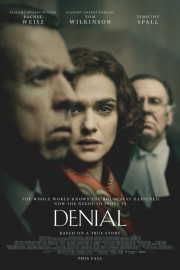Denial
Mick Jackson’s “Denial” has a compelling center to it- the complicated nature of proving historical truth. For millions (if not billions) of us worldwide, the Holocaust is a matter of historical truth. The extermination of six million Jews and others by the Nazis during WWII did, in fact, happen, and we know because of the testimonies of survivors and practitioners who managed to survive the war. Is it as simple as all that, however? I have no doubt that all of us have been confronted, whether through news media or in our own lives, with the idea of “Holocaust denial,” although we usually associate it with skinheads, neo-Nazis and other deplorables as a form of anti-Semitism. The case at the center of “Denial” is the true life libel suit brought against American Holocaust scholar Deborah E. Lipstadt (played here by Rachel Weisz) in the London courts by British historian and Holocaust denier, David Irving (Timothy Spall, in a suitably blustery performance that will likely remind many of a certain presidential candidate), for a portrayal she makes of him in her book about Holocaust denial. The significance of him bringing the suit in London is so that the burden of proof is on the defendant- she has to prove that what she wrote about Irving is an accurate representation. This means proving the literal truth about the actuality of the Holocaust in a court of law, for if the Holocaust is what many of us believe it to be, that means Irving is falsifying the facts for the sake of an agenda.
The focal point of the court case, and Irving’s claims of denial of the Holocaust, is the Auschwitz death camp. For Irving, the ruins of the bombed-out gas chambers do not align with the possibility of mass death occurring there- instead, he justifies the presence of cyanide by posing that it was used to decontaminate lice-ridden bodies and clothes. As Deborah’s lawyer, Richard Rampton (Tom Wilkinson), argues, though, during the trial (which is in front of a lone judge rather than a jury, which is possible in England), if the furnaces show the bodies being cremated, why did they need to be decontaminated? Those chambers certainly couldn’t have been used as air raid bunkers for troops stationed there. Before the trial begins, Rampton, Lipstadt and some of her defense team take a trip to Auschwitz, and for the Jewish Deborah, it is an emotional experience. The filmmakers were actually allowed to shoot the scene inside Auschwitz, and it is a haunting moment that crushes us under the weight of the significance of the place. (Even Spielberg was unable to film inside there for “Schindler’s List.”) It illuminates what is at stake in the trial astoundingly- if Deborah wins, our understanding of the most horrifying moment in modern human history remains unchallenged; if she loses, people like Irving are able to spout off their terrible mockery of history and have it normalized by society. Jackson (“The Bodyguard,” “Volcano”) and writer David Hare (“The Hours”) aren’t really able to get past the courtroom drama aspects of the story, but the three main characters are cast well, and all three actors do quite fine work, although the best moments are where we witness moments Lipstadt has with a Holocaust survivor, who wants to have their story told in court. That people like Irving still exist is unreal to many of us, and watching Deborah and her team try to take one on is empowering and important. It’s one step towards greater understanding and reconciliation with an unfathomable past, and it’s something “Denial” brings to life quite well.










